
Guests
- Eyad Amawiaid coordinator in the Gaza Strip.
Celebrations broke out in Gaza and Israel overnight after President Trump announced Israel and Hamas have agreed on the first phase of a hostage-ceasefire deal. Trump said the remaining Israeli hostages held in Gaza would likely be released on Monday. Israel has also agreed to release hundreds of Palestinians held captive in Israeli prisons, but a final list of prisoners has not been released. Eyad Amawi, an aid coordinator who joins us from Deir al-Balah in the Gaza Strip, has “mixed feelings, happiness, worries and hopes” about the deal. He is cautious due to “Israeli habits” during ceasefire agreements to “grant themselves more time to punish our people, to increase the suffering.”
During the first phase of the deal, Israel will withdraw forces from parts of Gaza and allow more humanitarian aid into the besieged territory. A ceasefire is expected to begin after the Israeli government formally approves the deal.
Transcript
NERMEEN SHAIKH: Celebrations broke out in Gaza and Israel after President Trump announced Israel and Hamas have agreed on the first phase of a hostage-ceasefire deal. President Trump said the remaining Israeli hostages held in Gaza would likely be released on Monday. Israel has also agreed to release Palestinians held captive in Israeli prisons, but a final list of prisoners has not been released. During the first phase of the deal, Israel will withdraw forces from parts of Gaza and allow more humanitarian aid into the besieged strip.
A ceasefire is expected to begin after Israel formally approves the deal later today, but Israel is still carrying out attacks in Gaza, killing at least 10 Palestinians over the last day. The Palestinian journalist Motasem Dalloul just revealed Israeli forces have killed his third son. Two other sons were killed last year.
AMY GOODMAN: There are many questions over what will happen after Hamas releases the remaining hostages. Amnesty International said the ceasefire deal must be a pathway to [ending] what it called “Israel’s unlawful occupation, apartheid and genocide.”
In the city of Khan Younis, residents responded to the ceasefire deal.
HUSSEIN SHALADAN: [translated] I don’t have a spoon nor a fork in my house. It is just some stones. Others lost their families. Some lost everything they own, and some had their families wiped out from the civil registry, and they stayed alone. Others lost their legs and limbs. Some lost everything, and some went missing, as well. We ask God for safety, and may safety, security, goodness and peace prevail.
NERMEEN SHAIKH: In Israel, hostage families welcomed the news of a deal. This is Gil Dickmann. His cousin, Carmel Gat, was taken hostage on October 7th and killed in captivity.
GIL DICKMANN: I couldn’t be happier. The fact that, finally, hostages are coming back, that the deal was signed, that the war is over, it’s a happy day. It’s a holiday here. That’s what we wanted for such a long time. Carmel, my cousin, was murdered in captivity. She’s not going to come back. It’s too late for her. But it’s not too late for 48 hostages who are going to come back. Twenty of them are going to come back alive. And this is such a happy moment for us, the families of the hostages, such a happy moment for all Israelis and for all the Middle East.
NERMEEN SHAIKH: Meanwhile, British Prime Minister Keir Starmer praised the deal while on a trip to India.
PRIME MINISTER KEIR STARMER: I’m grateful for the tireless diplomatic efforts of Egypt, Qatar, Türkiye, the United States and many others in securing this crucial first step. This agreement must now be implemented in full, without delay, and be accompanied by the immediate lifting of all restrictions on lifesaving humanitarian aid to Gaza. The U.K. will support these crucial immediate steps and the next stages of the talks to ensure the full implementation of the peace plan.
AMY GOODMAN: We go now to Deir al-Balah in central Gaza, where we’re joined by Eyad Amawi, a representative of the Gaza Relief Committee.
Eyad, welcome back to Democracy Now! Can you explain, describe to us the reaction on the ground to this ceasefire deal?
EYAD AMAWI: Thank you, Amy. And thank you for Democracy Now! for your interesting.
Yes, now it’s mixed feelings — happiness, worries and hopes — and really a lot of celebration here and also a lot of sadness. It’s a mix, because the previous time we suffered from genocide, from approaching us trying to expulsion us from our homes, from our land, from our city, Gaza. Up to this moment, we’re still waiting the exact appointment for complete implementations. So, we’re still waiting until this moment, the people hearing some tank shelters and guns in the coastal area road, and they prevent the people from returning to Gaza City. We have some casualties now at this time. So, we hope the ceasefire implementation will come speedily, without any delay.
NERMEEN SHAIKH: So, Eyad, you’ve laid out a number of steps that you think should be the priority in terms of aid getting into Gaza and the assistance that’s needed in Gaza most urgently. Could you just lay out those things?
EYAD AMAWI: Yeah. Firstly, entering the numbers of trucks that determined before, maybe 400, six — up to 600, without restrictions, especially for the nutritious food. And second, the huge machinery and cars and bulldozers that can leveling the lands and remove rubbles to set up new camps to meet our needs and our displacement people. They haven’t shelters, haven’t tents. So, this is the two main issues that we need urgently in Gaza Strip, and repairing water desalination and repairing sewage networks urgently to prevent pollutions and bad environment here that cause diseases and spread of infectious disease also in Gaza.
NERMEEN SHAIKH: You’ve also called for population distribution. If you could explain why?
EYAD AMAWI: Yeah. We now live 1 million and half in the shrinked area, especially in the western part, from the south part of Deir al-Balah and in al-Mawasi region. It’s just 17 square kilometers. You can imagine, when we live in this circumstances, we will not have a normal life, and it’s very bad conditions here. So, when we talk about redistribution peoples in all of the Gaza Strip, it will be better, and we can provide people with their needs, with their aids and with their shelters. Everything will be OK.
AMY GOODMAN: Can you explain? Although we reported that a ceasefire deal has been reached, or President Trump did, there have been heavy airstrikes and artillery shelling in Gaza City and Khan Younis, Israeli quadcopters also reported to have dropped bombs on civilians in Gaza City. About nine people or 10 were killed in attacks in the last hours. Meanwhile, Israeli tanks blocking al-Rashid Road to prevent displaced Palestinians from returning to their homes in northern Gaza. When do you see these attacks stopping, also people killed again trying to get food?
EYAD AMAWI: OK, that’s a great. You can distinguish between two things here in our local — with our local peoples. The annunciation without determining exact hour, it’s also the Israeli habits in all of the ceasefire agreements. So, they grant themselves more time to punish our people, to increase the suffering. So, when we talk about the agreement as official agreement, we need to determine the exact hour to prevent the continuity of this suffering immediately.
AMY GOODMAN: Eyad Amawi, we want to thank you for being with us. I want to ask: Were you in the streets celebrating as you heard this news?
EYAD AMAWI: We hope that, and we will celebrate, even though what’s still happening here and what we faced before. But it’s our life. We resume it, inshallah.
AMY GOODMAN: Eyad Amawi is a representative of the Gaza Relief Committee, coordinator for local NGOs, speaking to us to Deir al-Balah in central Gaza.
Coming up, we continue to look at the ceasefire-hostage deal. We will go to Israel, and we will go to Copenhagen, and we will go to Montreal to get response.
[break]
AMY GOODMAN: That’s Roger Waters performing “We Shall Overcome,” accompanied by a young Alexander Rohatyn on cello in the Democracy Now! studio.

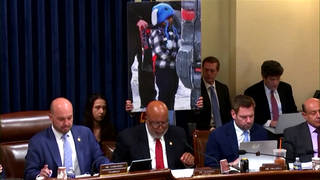

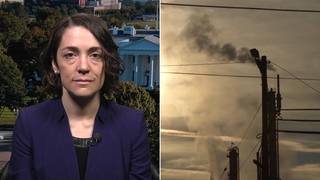
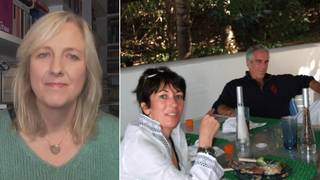





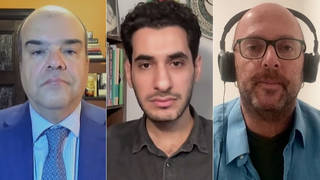

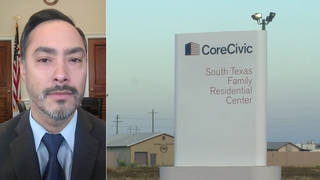
Media Options